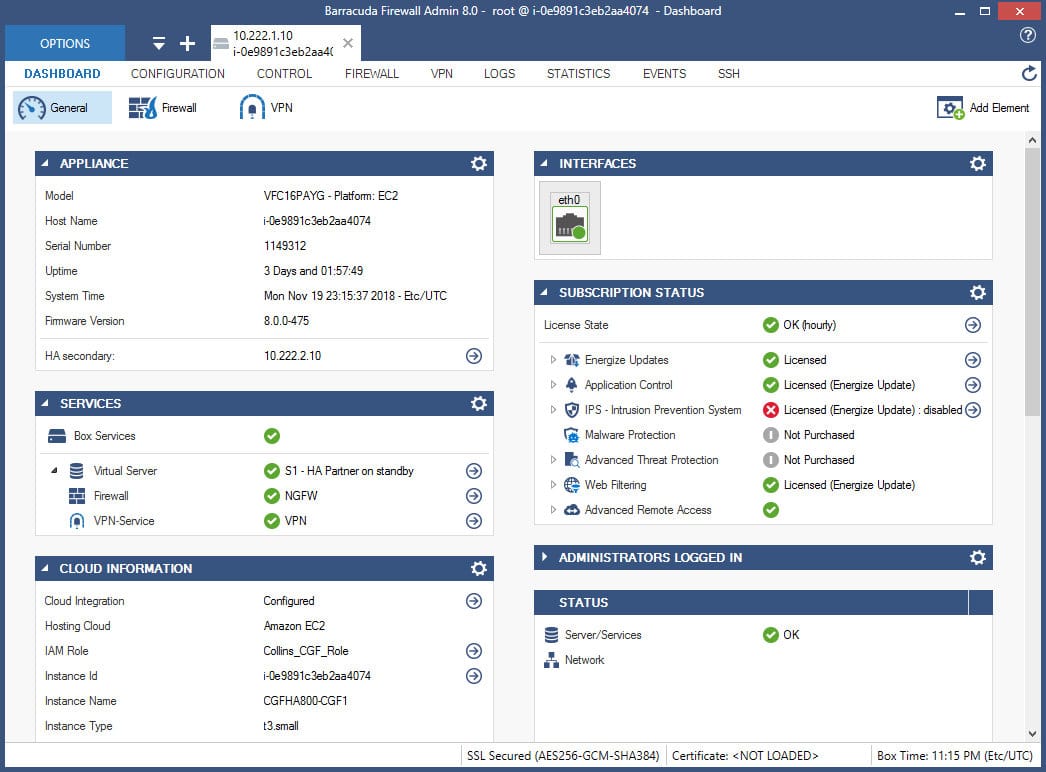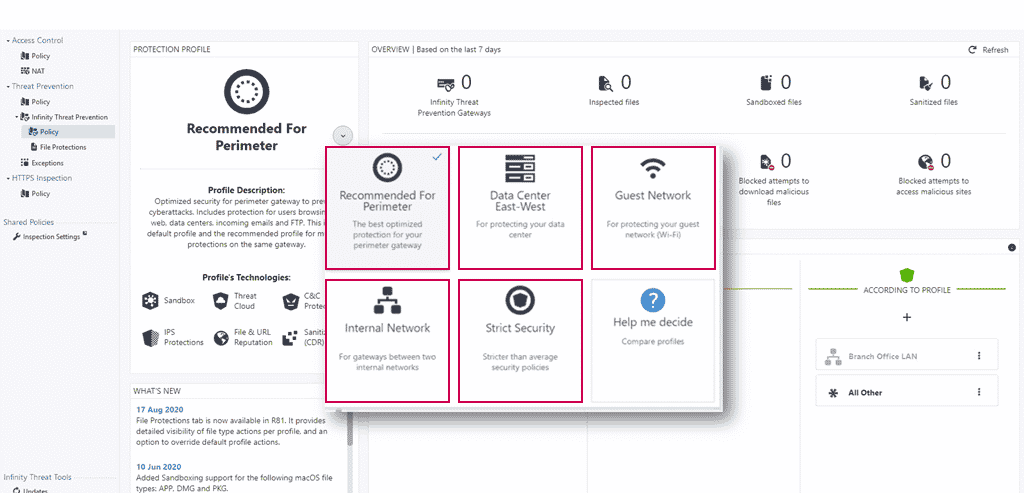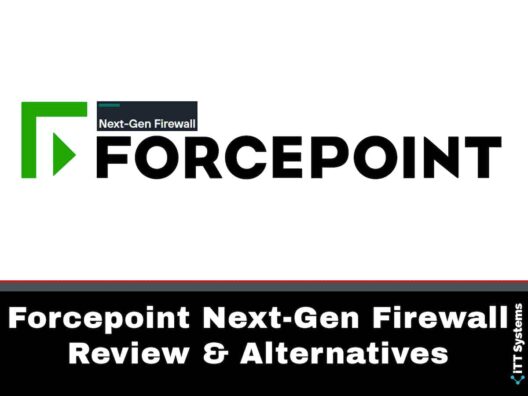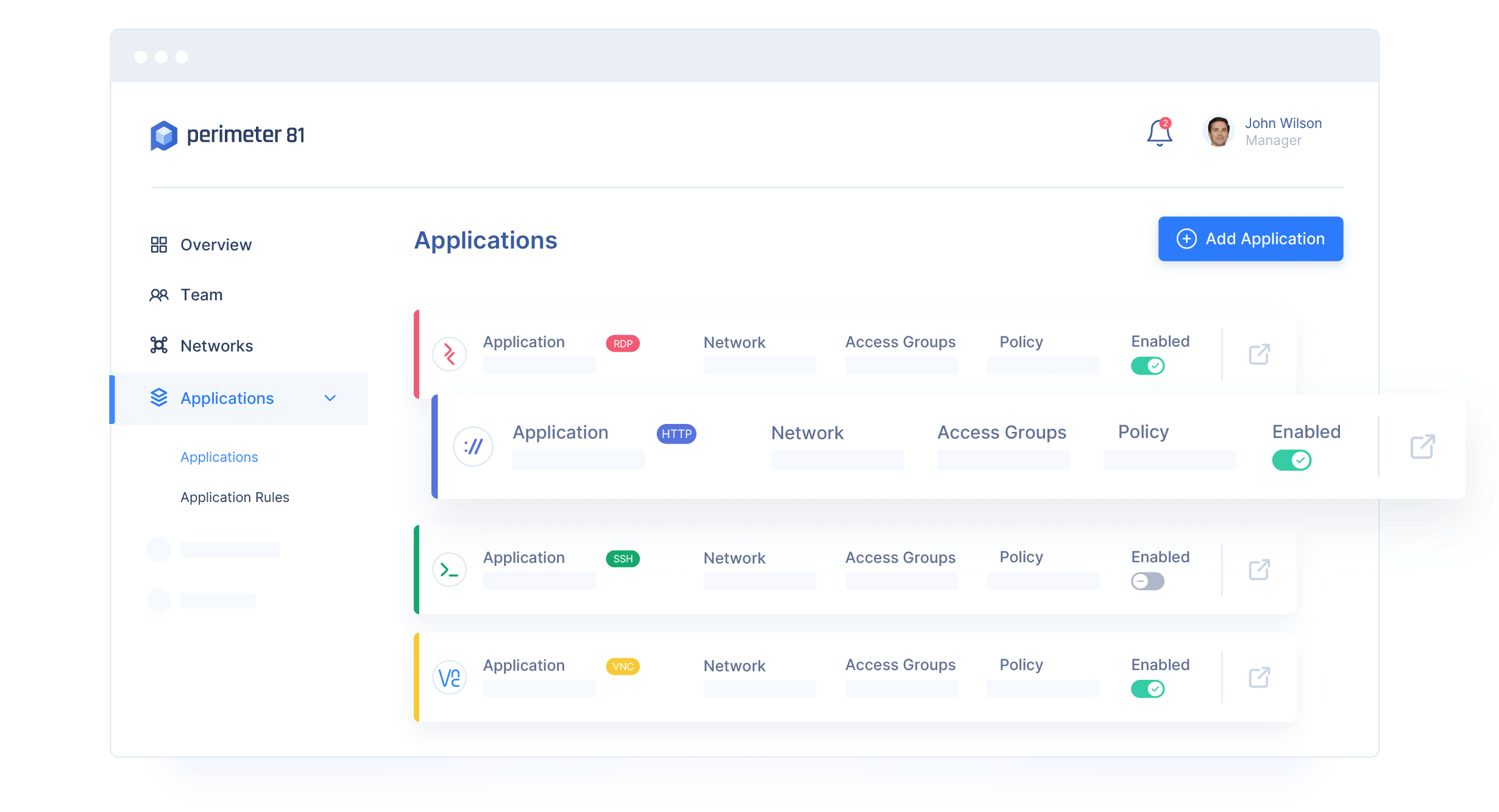Firewalls have become sophisticated over the years to meet the growing cyber threats. It's no longer about simply analyzing the packet headers and reporting the same to the concerned entities. Rather, today's firewalls are all-encompassing and come with advanced features to protect your network from security attacks like malware and even Distributed Denial of Service (DDoS). Since these firewalls are designed for the next-gen cyber criminals, they are rightly known as Next-Gen Firewalls (NGFW).
- Perimeter 81 FWaaS – EDITOR'S CHOICE Revolutionizes traditional firewall capabilities with its cloud-based approach, offering unparalleled flexibility and scalability for modern work environments, making it an ideal alternative to Forcepoint.
- Barracuda CloudGen Firewall – Adapts seamlessly to cloud environments, efficiently managing web traffic and providing robust protection against sophisticated threats.
- CheckPoint NGFW – Delivers comprehensive, scalable security across networks, combining 60 innovative services to robustly safeguard against zero-day attacks.
- Sophos Firewall – Excels in balancing network protection with performance, utilizing advanced decryption and inspection techniques for optimal operational efficiency.
ForcePoint is one of the top-rated NGFWs available today. It can block malicious attacks, reduce the chances of data loss or theft, and improve the overall security and efficiency of your operations. In this article, let's review ForcePoint to understand its strengths and weaknesses, and discuss its alternatives as well.
ForcePoint NGFW Features
Before we do a critical review of the product, let's take a moment to understand what ForcePoint NGFW offers for your business.
- Security Security is one of the key functions of a firewall and Forcepoint's NGFW fits this bill perfectly. It comes with built-in SD-WAN and zero-trust network access controls. What this means is that you can have a unified security policy and can implement the same through this NGFW, thereby making it easy to manage security through unified policies across your entire network.
- Visibility Its central console provides 360-degree visibility into your network, so you can quickly identify risks and mitigate them. Also, its integrated Intrusion Prevention Systems help you to avoid a breach and its resulting impact on your organization.
- Cost One of the biggest advantages of ForcePoint is that it reduces the total cost of ownership. It comes with advanced automation and AI to manage your complete network. Further, it offers a single management console for scaling up your security across the entire network.
- Deployment The other advantage of ForcePoint is that it offers flexible deployment options. You can orchestrate and automate deployment from anywhere with its advanced tools, and this can be a good option in today's work-from-anywhere environment. Also, you can deploy it on any hardware/software on the cloud, on-premises, or even in a hybrid cloud setup. Just depends on your network and its architecture.
- Access Control Its access control features encompass usage, command, and connection controls to streamline access and reduce the chances for unauthorized users to access your data.
- Deep Inspection ForcePoint NGFW's deep inspection capabilities ensure that every packet is thoroughly vetted for vulnerabilities and malware, thereby reducing the number of malicious packets entering your system.
Thus, these are some of the salient features of ForcePoint NGFW. Moving on, let's look at the pros and cons of this tool to better understand if it'll fit your requirements.
Pros:
- The Security Management console is easy to install and provides comprehensive visibility over different aspects of the network's security and performance.
- It comes with a central log server that supports custom filters for easy search.
- Supports multicast routing for more flexibility. This feature can come in handy for media and trading companies in particular.
- It offers comprehensive VPN client authentication.
- Forcepoint NGFW has both IPS and firewall capabilities, and can even double up as a load balancer
Cons:
- The firewall can be accessed only through the console, so if it's inaccessible, there's no other way to control the firewall. In other words, alternative access options are missing.
- Configuration is complex and requires advanced technical expertise.
- Not the best choice for the cloud, as it lacks CASB integration.
- It can consume a lot of network resources
- Not enough online documentation and technical resources.
Now that you know the pros and cons of ForcePoint NGFW, let's explore some alternatives that can be a better fit for your organization.
Our methodology for selecting ForcePoint NGFW alternative tool:
We've broken down our analysis for you based on these key criteria:
- The tool's capacity to adapt to varying network environments.
- Ease of deployment and user-friendly interface.
- The ability to scale with organizational growth.
- Comprehensive visibility and control over network activities.
- Cost-effectiveness and maintenance requirements.
1. Perimeter 81 FWaaS – GET FREE DEMO
Perimeter 81 FWaaS is designed for the future, as it brings all the capabilities of a firewall into the cloud. These features of a firewall are offered as a cloud service and hence it falls into a new category called Firewall-As-A-Service (FWaaS).
Key Features
- Protects remote workers and this can be highly helpful in a remote working environment.
- FWaaS is easy to configure, so you can customize it for different departments/tasks.
- Scales well to meet your organization's growth.
- Regardless of how complex your network is, managing it is easy through Perimeter 81's cloud interface.
- Provides comprehensive visibility into your network, so you can understand the impact of policy changes.
- No upfront capital expenses.
- Hassle-free maintenance and patch management, as these are handled by the service provider.
Why do we recommend it?
Perimeter 81 FWaaS is recommended for its innovative integration of traditional firewall capabilities into a cloud-based service, offering scalability, ease of management, and comprehensive network visibility, making it ideal for modern, distributed work environments.
In this product, all the local and cloud resources are connected to a single cloud firewall, that in turn acts as a central point for inspecting data and routing it accordingly. The biggest advantage of FWaaS is that it can enforce all security policies globally, regardless of the endpoints' location.
IT admins can easily change configurations, whitelist or blacklist URLs, create and modify access rules, block certain IP addresses, and more, through a central console that can be accessed through the Internet. Undoubtedly, this NGFW offers a lot of value to an organization.
Who is it recommended for?
This tool is particularly suited for businesses with remote workers or those undergoing growth, as it allows for easy customization and scaling without the need for upfront capital expenses, making it ideal for dynamic organizational needs.
Pros:
- Ideal for remote workforce protection
- Simplified, user-friendly cloud interface
- Easily scalable for organizational growth
- Comprehensive network visibility
Cons:
- May require initial adjustment for traditional network setups
Perimeter 81 FWaaS is an advanced and flexible solution that works well for any organization. Register for the free demo.
EDITOR'S CHOICE
Perimeter 81 FWaaS stands out as our top choice in the category of ForcePoint NGFW alternatives for its innovative approach to firewall management. This cloud-based solution transforms traditional firewall capabilities into a more flexible and scalable service, making it ideal for modern, dynamic work environments. It's especially effective in protecting remote workers, an increasingly crucial aspect in today's distributed workforce.
The ease of configuration, combined with comprehensive network visibility and hassle-free maintenance, makes it a preferred choice for IT administrators. The ability to enforce security policies globally, irrespective of endpoint location, sets Perimeter 81 apart in this field. Its cloud interface simplifies complex network management, ensuring that organizations of all sizes can efficiently secure their networks. This is why Perimeter 81 FWaaS is our top network monitor choice. Register for the free demo to experience its capabilities first-hand.
Download: Try Free Perimeter 81 Demo
2. Barracuda CloudGen Firewall

Barracuda CloudGen Firewall is an advanced option designed to leverage the benefits of the cloud. Its AI capabilities identify resource-intensive tasks like content filtering and move them to the cloud, so your network's performance is not impacted in any way. It also protects your business from threats and ensures that your critical applications are always available.
Further, there are two offerings – one specifically for SMEs and the other for distributed environments. These two offerings vary in terms of cost and the area they cover.
Key Features
- Protects your network against advanced, persistent, and sophisticated threats.
- Regulates web traffic and reduces the chances of DDoS attacks.
- Offers granular control to monitor applications and URLs in your business.
- Makes it easy to enforce access controls across different levels within your organization.
- Provides real-time updates to give you continuous visibility over your network.
Why do we recommend it?
Barracuda CloudGen Firewall stands out for its cloud-optimized performance and AI-driven content filtering, ensuring efficient threat protection without impacting network performance, making it suitable for businesses prioritizing uninterrupted operations.
In all, Barracuda CloudGen firewalls offer multilayered security for your network and are designed to provide a global response to a global network.
Who is it recommended for?
It's recommended for SMEs and organizations in distributed environments, given its dual offerings tailored to specific needs, ensuring both cost-effectiveness and comprehensive network protection.
Pros:
- Advanced threat protection capabilities
- AI-driven cloud optimization for resources
- Granular control for applications and URLs
- Continuous network visibility updates
Cons:
- Different offerings may be confusing for some users
3. CheckPoint NGFW

CheckPoint NGFW is another comprehensive firewall and a good alternative to ForcePoint. It comes with 60 innovative services that come together to prevent zero-day attacks on your network. Based on the proprietary Quantum Security Gateway, it can provide 1.5 Tb of threat prevention, and can scale well with your organization's growing needs.
Key Features
- Offers unified security across the entire network, so you have complete control and visibility over all that happens in it.
- Scales well on demand.
- Offers 15 different models to suit the needs of different enterprises.
- Reduces the complexity of setup and brings down the costs as well.
Why do we recommend it?
CheckPoint NGFW is recommended for its comprehensive suite of services, including 60 innovative features that effectively prevent zero-day attacks and its ability to scale with the organization's growth.
Overall, CheckPoint NGFW is a good alternative to ForcePoint as it comes with advanced technologies that can tackle some of the most sophisticated cyberattacks.
Who is it recommended for?
Ideal for enterprises needing a robust and scalable firewall solution, offering various models to suit diverse business sizes and requirements, while ensuring reduced setup complexity and cost.
Pros:
- Unified security across the network
- Scalable to meet business needs
- Variety of models for different enterprises
- Cost-effective with reduced setup complexity
Cons:
- The range of features might be overwhelming for smaller organizations
4. Sophos Firewall

Sophos firewall protects your network from threats and at the same time, accelerates the traffic of your critical applications and systems. In other words, it ensures that there's no impact on the critical aspects of your operation when you use Sophos firewall. At the same time, it ensures performance and resiliency for your network.
Key Features
- Uses TLS 1.3 decryption to eliminate blind spots.
- Implements deep packet inspection to identify sophisticated attacks.
- Optimizes the performance of your critical applications.
- Handles performance-based routing to avoid latency.
- Its control center provides comprehensive visibility into the state of your network's operations.
Why do we recommend it?
Sophos Firewall is notable for its ability to protect networks without compromising the performance of critical applications, using advanced decryption and inspection techniques.
In all, Sophos firewall is a good choice for any organization that's looking to implement affordable and efficient firewall services that don't impact its critical operations.
Thus, these are some of the alternatives to ForcePoint, and most of them leverage the latest in cybersecurity to provide extensive coverage for your network.
Who is it recommended for?
This firewall is a great option for organizations needing efficient, performance-focused network security, particularly those looking for an affordable solution that enhances network resiliency.
Pros:
- Effective TLS 1.3 decryption for security
- Deep packet inspection for attack identification
- Performance optimization for critical applications
- Performance-based routing to minimize latency
Cons:
- May require technical expertise for optimal setup and management
Final Thoughts
To conclude, ForcePoint NGFW is a good choice for many organizations as they come with advanced features to protect your network from cyberattacks. That said, this is not the only choice available, and you can choose from other options that offer similar protection levels for your organization. While one is not necessarily better than the other, the choice depends on your organization's size, type of network architecture, deployment preference, and more.
We hope this information comes in handy for deciding the appropriate firewall for your organization's needs. Check out our guides for more in-depth information about different products.





